American Va-va-voom singer Abbe Lane (1932) achieved her greatest success as the vocalist for Xavier Cugat's orchestra, but she also appeared in American and several Italian films. The beautiful, curvaceous Lane was nicknamed 'the swingingest sexpot in show business.'
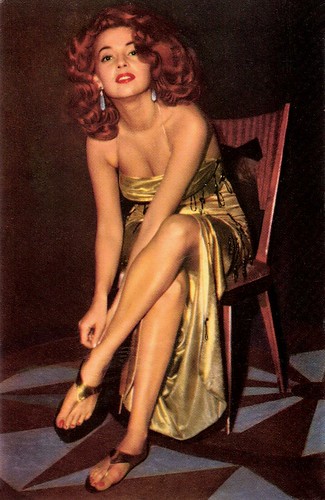
German card by Ufa, no. 1039. Photo: Ufa.
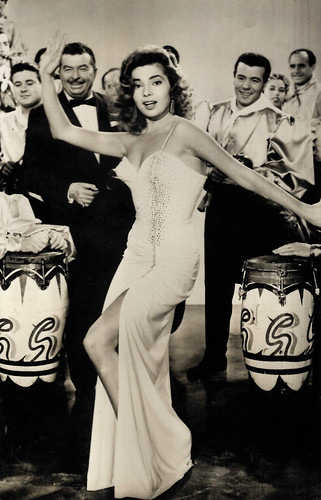
Spanish postcard by Ediciones J.R.B., no. 85/4. Photo: Ceo. Abbe Lane and Xavier Cugat's Orchestra.
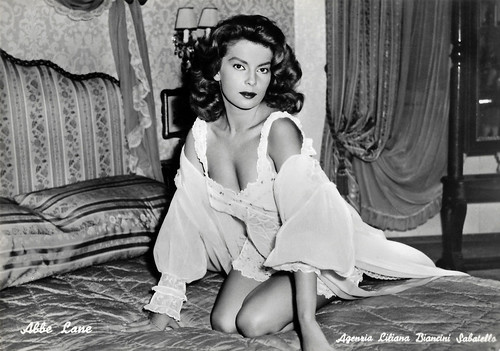
Italian postcard by Bromofoto, Milano, no. 1457. Photo: Agenzia Liliana Biancini Sabatello.
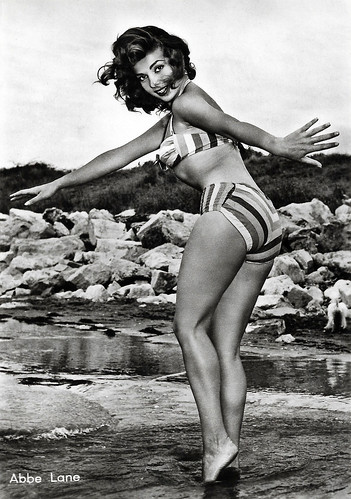
Italian postcard by Bromostampa, Milano, no. 123.
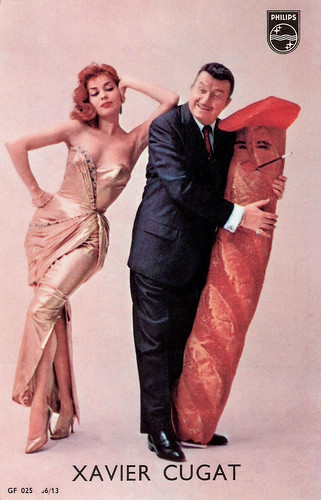
Xavier Cugat. Promotion card by Philips, no. GF 025 66/13.
Abbe Lane was born Abigail Francine Lassman to a Jewish family in Brooklyn, New York, in 1932. She began her career as a child actress on radio and in movie shorts by Vitaphone. From there she progressed to singing and dancing on Broadway.
At 16, she appeared on Broadway in George Abbot's 'Barefoot Boy with Cheek'. A year later, she was a featured vocalist on the Vincent Lopez television show and worked on stage in a Michael Todd production of 'As the Girls Go'. Bandleader Xavier Cugat spotted her calypso number in that stage show and hired her as a vocalist for his famous orchestra. In 1952, the two married and Cugat, more than thirty years her senior, influenced her music which favoured Latin and rumba styles.
With her palpable sexuality, she became a nightclub sensation as well as a fixture on television variety shows, such as Toast of the Town. She attracted attention in talk shows for her suggestive comments such as "Jayne Mansfield may turn boys into men, but I take them from there". Her costume for an appearance on the Jackie Gleason Show was considered too revealing and she was instructed to wear something else.
Lane made her Hollywood debut in the Western Wings of the Hawk (Budd Boetticher, 1953), followed a year later by Ride Clear of Diablo (Jesse Hibbs, 1954) starring Audie Murphy. Cugat supervised her musical number in another Western Americano (William Castle, 1955), starring Glenn Ford.
When the live Xavier Cugat Show premiered in 1957, Lane was front and centre. She recorded a series of Latin jazz-inspired LPs for RCA. In 1958 she collaborated with Tito Puente on the top-selling record album 'Be Mine Tonight' and she also starred opposite Tony Randall in the Broadway musical 'Oh, Captain!'. Lane later recorded her songs in that musical on a solo album.

Italian postcard by Bromostampa, Milano, no. 113.

Photo with autograph.

Belgian postcard by Bromofoto, Brussels.

Italian postcard by Bromofoto, Milano, no. 151.
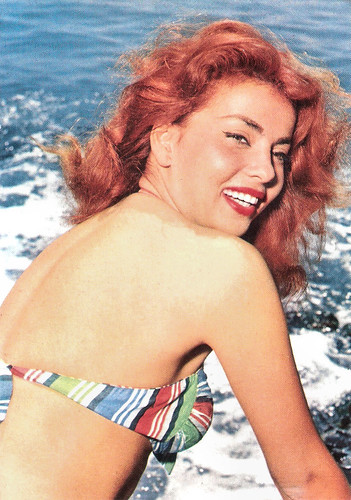
French postcard by Editions P.I., Paris, offered by Les Carbones Korès 'Carboplane', no. 1034. Photo: Paolo Costa / Rapho.
Despite these successes, Hollywood offered Abbe Lane mainly decorative parts and like many other American stars, she moved to Rome to work in Italian films. In 1955 she and Cugat toured Italy, where she co-starred in the film Quando tramonta il sole/Sunset in Naples (Guido Brignone, 1955). Her attempts to promote the project were complicated when Italian television network RAI called her 'too sexy' to appear on air.
More Italian films soon followed, like the drama I girovaghi/The Wanderers (Hugo Fregonese, 1956) starring Peter Ustinov, and the comedy Tempo di villeggiatura/Time of Vacation (Antonio Racioppi, 1956) with Vittorio de Sica. As Eva, she played the female lead in the Italian comedy Totò, Eva e il pennello proibito/Toto in Madrid (Stefano Vanzina, 1959) starring Totò and Louis de Funès.
When Cugat moved back to New York, Lane chose to stay in Italy. The distance proved too much for the couple, and they divorced in 1964. Lane remained in the public eye throughout the 1960s, guest-starring on TV series including F Troop (1966), The Man from U.N.C.L.E. (1966), The Flying Nun (1968), and The Brady Bunch (1970), but her career flagged throughout the 1970s. She appeared in a segment of Twilight Zone: The Movie (George Miller, 1983) in the role of an airline stewardess and did some final TV appearances.
In 1992 Abbe Lane unexpectedly resurfaced with 'But Where Is Love?', an autobiographical novel about a Broadway ingénue who falls in love with a Latin bandleader. She was married to Peter Leff from 1964 till he died in 2020.

French postcard by Editions P.I., Paris, presented by Les Carbones Korès Carboplane, no. 996. Photo: Paramount. Publicity still for Maracaibo (Cornel Wilde, 1958).

Belgian postcard. Photo: Universal.

German postcard by WS-Druck, Wanne-Eickel, no. 307. Photo: Stella / Union.

Italian postcard by R.D.V., Milano, no. 162.
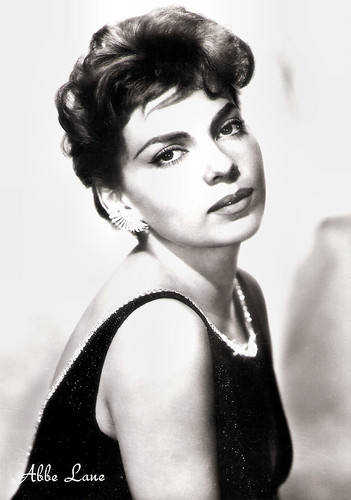
Italian postcard by Rotalfoto, no. 858.
Sources: Frank Thistle (Adam), Carina MacKenzie (Los Angeles Times), Jason Ankeny (AllMusic), Wikipedia and IMDb.

German card by Ufa, no. 1039. Photo: Ufa.

Spanish postcard by Ediciones J.R.B., no. 85/4. Photo: Ceo. Abbe Lane and Xavier Cugat's Orchestra.

Italian postcard by Bromofoto, Milano, no. 1457. Photo: Agenzia Liliana Biancini Sabatello.

Italian postcard by Bromostampa, Milano, no. 123.

Xavier Cugat. Promotion card by Philips, no. GF 025 66/13.
Nightclub sensation
Abbe Lane was born Abigail Francine Lassman to a Jewish family in Brooklyn, New York, in 1932. She began her career as a child actress on radio and in movie shorts by Vitaphone. From there she progressed to singing and dancing on Broadway.
At 16, she appeared on Broadway in George Abbot's 'Barefoot Boy with Cheek'. A year later, she was a featured vocalist on the Vincent Lopez television show and worked on stage in a Michael Todd production of 'As the Girls Go'. Bandleader Xavier Cugat spotted her calypso number in that stage show and hired her as a vocalist for his famous orchestra. In 1952, the two married and Cugat, more than thirty years her senior, influenced her music which favoured Latin and rumba styles.
With her palpable sexuality, she became a nightclub sensation as well as a fixture on television variety shows, such as Toast of the Town. She attracted attention in talk shows for her suggestive comments such as "Jayne Mansfield may turn boys into men, but I take them from there". Her costume for an appearance on the Jackie Gleason Show was considered too revealing and she was instructed to wear something else.
Lane made her Hollywood debut in the Western Wings of the Hawk (Budd Boetticher, 1953), followed a year later by Ride Clear of Diablo (Jesse Hibbs, 1954) starring Audie Murphy. Cugat supervised her musical number in another Western Americano (William Castle, 1955), starring Glenn Ford.
When the live Xavier Cugat Show premiered in 1957, Lane was front and centre. She recorded a series of Latin jazz-inspired LPs for RCA. In 1958 she collaborated with Tito Puente on the top-selling record album 'Be Mine Tonight' and she also starred opposite Tony Randall in the Broadway musical 'Oh, Captain!'. Lane later recorded her songs in that musical on a solo album.

Italian postcard by Bromostampa, Milano, no. 113.

Photo with autograph.

Belgian postcard by Bromofoto, Brussels.

Italian postcard by Bromofoto, Milano, no. 151.

French postcard by Editions P.I., Paris, offered by Les Carbones Korès 'Carboplane', no. 1034. Photo: Paolo Costa / Rapho.
Too sexy for the RAI
Despite these successes, Hollywood offered Abbe Lane mainly decorative parts and like many other American stars, she moved to Rome to work in Italian films. In 1955 she and Cugat toured Italy, where she co-starred in the film Quando tramonta il sole/Sunset in Naples (Guido Brignone, 1955). Her attempts to promote the project were complicated when Italian television network RAI called her 'too sexy' to appear on air.
More Italian films soon followed, like the drama I girovaghi/The Wanderers (Hugo Fregonese, 1956) starring Peter Ustinov, and the comedy Tempo di villeggiatura/Time of Vacation (Antonio Racioppi, 1956) with Vittorio de Sica. As Eva, she played the female lead in the Italian comedy Totò, Eva e il pennello proibito/Toto in Madrid (Stefano Vanzina, 1959) starring Totò and Louis de Funès.
When Cugat moved back to New York, Lane chose to stay in Italy. The distance proved too much for the couple, and they divorced in 1964. Lane remained in the public eye throughout the 1960s, guest-starring on TV series including F Troop (1966), The Man from U.N.C.L.E. (1966), The Flying Nun (1968), and The Brady Bunch (1970), but her career flagged throughout the 1970s. She appeared in a segment of Twilight Zone: The Movie (George Miller, 1983) in the role of an airline stewardess and did some final TV appearances.
In 1992 Abbe Lane unexpectedly resurfaced with 'But Where Is Love?', an autobiographical novel about a Broadway ingénue who falls in love with a Latin bandleader. She was married to Peter Leff from 1964 till he died in 2020.

French postcard by Editions P.I., Paris, presented by Les Carbones Korès Carboplane, no. 996. Photo: Paramount. Publicity still for Maracaibo (Cornel Wilde, 1958).

Belgian postcard. Photo: Universal.

German postcard by WS-Druck, Wanne-Eickel, no. 307. Photo: Stella / Union.

Italian postcard by R.D.V., Milano, no. 162.

Italian postcard by Rotalfoto, no. 858.
Sources: Frank Thistle (Adam), Carina MacKenzie (Los Angeles Times), Jason Ankeny (AllMusic), Wikipedia and IMDb.
No comments:
Post a Comment